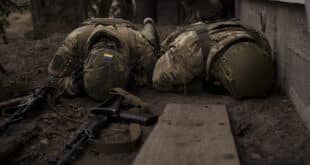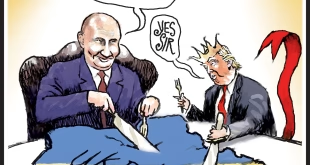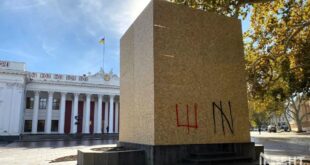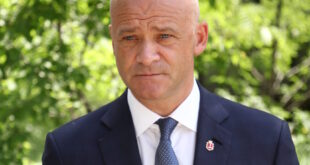[Versione italiana qui] If the ceasefire negotiated on September 5 holds – which is not granted, with Russian troops just steps from the capture of Mariupol after reconsolidating control over the area between Donetsk, the coast of the Azov Sea, and the Russian border – Ukraine’s president Petro Poroshenko will still have to answer a series of questions of strategic importance for the country. Russia’s aggression of Ukraine is undeniable; now Ukrainian leaders have to make a difficult choice: either aim for a negotiated reintegration of the Donbass, sacrificing independence and sovereignty in exchange for territorial integrity (at least in part, since no one seems to be questioning the irreversibility of the Russian annexation of Crimea anymore), or accept a frozen conflict along the current frontlines, sacrificing territorial integrity for the sake of independence and sovereignty. These options are related to two precedents in Central and Eastern Europe. The first scenario is that of the Serb-majority entity in the consociativist structure of post-Dayton Bosnia and Herzegovina, the Republika Srpska; the second scenario is that of the Moldovan region of Transnistria, separated from the capital Chisinau since more than 20 years today.
If the negotiations in Minsk between the Kiev government and the eastern rebels (‘terrorists’ yesterday, ‘interlocutors’ today) continue, their ultimate goal would be a negotiated reintegration of these areas as part of the Ukrainian state in exchange for the recognition of greater autonomy. The precise contours of the agreement are still to be determined, but given the disproportion of the forces (the rebels can count on the unquenchable, though covered, armed support of the Russian army) it is clear that Kiev will have to offer a lot if it wants to preserve at least part of the its territorial integrity: first of all, the guarantee of neutrality and military non-alignment, and the respect for language rights (paradoxically, both of these requirements were already fulfilled well before the conflict was started [1]). Now, however, the rebels and their sponsors in the Kremlin could also request the annulment of the Association Agreement with the European Union and/or a veto on Ukrainian foreign policy and on other matters deemed of “vital interest”. Finally, they might want to consolidate the presence of the militias (and of the Russians among them) as a self-defence force of the autonomous regions, or request a medium-term peacekeeping intervention from Russia to ensure the terms of the agreement, as already takes place in the breakaway regions of Georgia. On the other hand, the Ukrainian army does not seem to be able to prevent the permanence of Russian troops and paramilitary rebels within its borders, and NATO does not seem interested in or able to help them do so. In this case, the scenario would be a Republika Srpska – Republika Novorossijska? – within the borders of Ukraine, able to heavily influence its domestic politics, acting as the long arm of the Kremlin.
If such a scenario came into being, it would be the final step in the non-recognition by Moscow of the self-determination of the Ukrainian people (whose independence in 1991 continues to be considered by too many within Russia only as a temporary accident) and the direct subordination of Ukraine to Moscow’s sphere of influence. It is also difficult to say whether such an agreement could ensure the survival of the ruling political elite of Kiev, or if it would trigger a new “Maidan”, with the risk of further Russian intervention to achieve a final regime change in Kiev. The negotiated reintegration of the Donbass could well prove to be a poisoned chalice.
The alternative to this scenario is that the truce holds, but the negotiations between the government of Kiev and rebels supported by Moscow fail, freezing the conflict along the present line of contact. In this case, Ukraine would give up its territorial integrity (already deeply affected by the forced separation of Crimea), but could maintain its independence and sovereignty. The parallel is with Transnistria, a separatist region of Moldova which since 1991 exists as an unrecognizedstatelet, secured only by the presence on site of the 14th Division of the Russian army. Over the years, despite the impossibility of reaching a reintegration agreement with the separatist authorities of Tiraspol, the government of Chisinau has continued its path towards the European Union, by which it is today considered the ‘best pupil’ in the framework of the Eastern Partnership and of the Neighbourhood Policy, having signed the Association Agreement and the Free Trade Agreement (DCFTA) and obtained the liberalisation of the visa regime. As for NATO, Moldova cooperates with the Alliance in accordance with the Partnership for Peace of 1994, while maintaining formal neutrality. The European integration of Moldova continued over time, so that the idea to grant the country an explicit perspective of future accession to the EU was recently put forward, delaying to a later moment the discussion on the reintegration or less of the breakaway region of Transnistria. Despite the obvious differences in size, strategic weight, and historical significance, the precedent of small Moldova may be instructive also for neighbouring Ukraine.
For Moscow, maintaining military control over the Donbass and its “people’s republics”, while losing the rest of Ukraine, could still be a win and another gusset in that “arc of instability” (Transnistria, Crimea, Abkhazia , South Ossetia, Nagorno-Karabakh) whose consolidation the Kremlin has encouraged to ensure for itself the last word on the internal affairs of the countries in its “near abroad” for the medium term. For Kiev, its government and its people, who have invested so much in terms of resources and political capital in the path to Europe, a Transnistrian scenario for the Donbass would mean giving up at least temporarily an already non-existent territorial integrity in exchange for maintaining independence and sovereignty. This could be a solution more politically acceptable (despite the economic costs of losing a region with high industrial capacities) than a reintegration entrusting the eastern rebels, and their sponsors in Moscow, with the last word on the internal affairs of Ukraine in an institutionalized way and for an indefinite period of time.
[1] Ukraine declared itself a “permanently neutral state, which does not take part in military blocs,” as well as nuclear-free (on the non-nuclear choice of independent Ukraine, see Davide Denti, “Counterproliferation revisited”, 2013, at Academia.edu) with the 1990 Declaration of Sovereignty (Article 9) on which the Constitution of 1996 is based, a policy then reconfirmed in 2010. Kiev maintains a bland level of relations with NATO, equal to the one between NATO and Russia, based for both on the 1994 Partnership for Peace agreements. In addition, following the 2012 law on minority rights, the Russian language is official in several regions of Ukraine in which it is used by more than 10% of the population, including Donetsk and Lugansk, as well as Sebastopol. This law was indeed criticized (even by the Council of Europe) for the high threshold percentage required, which would protect only Russian at the expense of the rights of smaller linguistic minorities. Despite the parliamentary debate and rumours about it, this law was not repealed by the new Yatsenyuk / Turchynov administration in 2014 and is still in force.
The original version of this article was published, in Italian, on the website of Aspenia Online on September 8, 2014
 East Journal Quotidiano di politica internazionale
East Journal Quotidiano di politica internazionale




